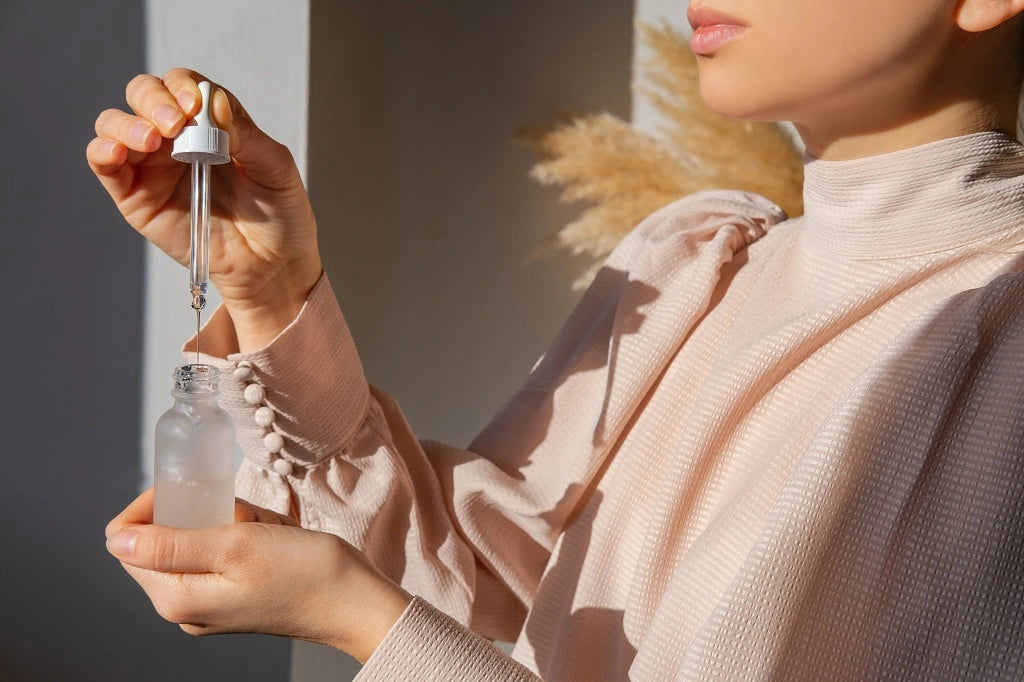
A complete Guide To Retinol - Uses, Benefits & More

Dr. Deepthi Prasad, MBBS.
Written by Our Editorial Team
Retinol is a much-loved skincare ingredient because it works brilliantly to diminish the signs of ageing. A derivative of Vitamin A, retinol is considered the gold standard in anti-ageing. As effective as it is, Retinol is a tricky skincare active and happens to be available in different concentrations. Despite its widespread popularity, there is a lot of mystery and misinformation about this ingredient. So, let’s figure out the intricate scientific details about this super-hyped anti-ageing hero.
What is Retinol?
As mentioned before, Retinol is a derivative of Vitamin A. It helps in stimulating cell turnover by accelerating collagen production in the skin. Contrary to belief, Retinol is not an umbrella term for all Vitamin A derivatives; in fact, Retinoids is the general term used for Vitamin A derivatives, be it natural or synthetic.
The first retinoid to enter the market was Retin A or Tretinoin, which is a prescription-only ingredient. It helped in treating acne and diminishing lines and wrinkles. However, it causes skin purging which includes flakiness, dryness, skin irritation, and bumps. Fortunately, this problem subsides once the skin becomes tolerant to tretinoin.
Thanks to science, there are a variety of sophisticated Vitamin A derivatives available on the market. The different intensities and properties have ensured that there is a retinoid for every skin type.
How does Retinol work?
Retinol by itself doesn’t do the job, the magic begins when it converts into retinoic acid, which is the only form of Vitamin A that can be absorbed by the skin. The conversion takes place as follows:
Retinol esters → Retinol → Retinaldehyde → Retinoic Acid
To simplify the aforementioned table, the further away a form of Vitamin A is, the less powerful it is, but at the same time, it's gentler. Owing to this conversion system, derivatives like Tretinoin and Retinaldehyde take a lesser time to show anti-ageing results, while Retinol and Retinyl Palmitate take a longer period to show results.
Use of Retinol helps the skin cells increase its recuperative abilities by accelerating cell turnover. It has been shown to improve skin tone, texture hyperpigmentation, acne, and fine lines. This miraculous ingredient promotes collagen synthesis and prevents post-inflammatory hyperpigmentation as well.
Uses of Retinol: How to get started on a Retinol routine?
When it comes to skin care, most skin experts recommend treading slowly when you embark upon your Retinol route. In case your skin hasn’t been exposed to active ingredients, chances are it might react to Retinol. Therefore, start slow, use a lower concentration of Retinol and use it twice a week, to build tolerance. Build a moisturizer barrier before and after applying the Retinol; this is also known as the sandwich method. Slowly increase the frequency of application to 3 then 5 and finally 7 days a week.
Be sure to observe your skin during this skin treatment process, in case it starts drying and flaking, reduce the frequency of use and change your moisturizer to a more emollient one. Also, relegate the use of retinols in the night time skincare routine, as retinol breaks down when exposed to sunlight and loses its efficacy. Serum formulas tend to delve deeper into the skin for advanced results, therefore using a Retinol Serum will work better than its cream counterparts.
Ensure that you use an SPF of 50 PA+++ in the morning because Retinoids make the skin susceptible to photodamage, and that will undo all the skin repair done overnight.
How to use Retinol?
It is important to understand the uses of retinol to make the most of its skin enhancing properties. Most people do not know how to use Retinol and end up damaging their skin. As mentioned earlier, use Retinol only at night. Integrate this ingredient into your routine slowly and gently. Cleanse your skin with a gentle face wash, and apply a hydrating toner that doesn’t contain any active ingredients. Next up, apply a thin layer of moisturizer and allow it to get absorbed into the skin. Take a pea-sized amount of the retinol serum or cream of your choice and apply it to your skin, follow it up with another layer of moisturizer or a skin-soothing oil.
Do not forget to use it on the neck, as it is the first place where signs of ageing begin to appear. Always remember to apply a small amount only, as the skin takes time to get used to Retinoids and taking necessary precaution to protect your skin is of primary importance. The efficacy of the product doesn’t increase if you apply more than required. Keep an eye on your skin, while using retinoids, as the ingredient is infamous for causing skin purging. In case your skin is intolerant and you experience side effects of retinol; you should move to a lower concentration or a lower gentler Vitamin A derivative in the Retinoid family.
Which is the best Retinoid?
Contrary to popular belief Retinol isn’t the best Vitamin A derivative. When it comes to over-the-counter Retinoids, Retinaldehyde is the most powerful of them all. The best part is that it is gentle on the skin and causes less purging than Retinol. Being the precursor to Retinoic Acid, which is the only bioavailable form of Vitamin A, it works 11 times faster in showing results. Plus, it is the only anti-bacterial retinoid, which means it is equally effective in treating acne. Retinaldehyde has all the benefits of retinol, minus the fuss of skin purging. It is, most definitely a miracle worker when it comes to all-around skincare.
ThriveCo Youth Renewal Serum
Powered with the goodness of Retinaldehyde, ThriveCo youth Renewal Serum is an effective anti-ageing product that also combats acne while keeping hyperpigmentation at bay. This all-rounder is an upgrade to a regular retinol routine. Retinaldehyde works 11 times faster than Retinol and doesn’t sensitize the skin. The addition of a peptide-based age delay complex, encapsulated retinol, and Niacinamide, makes this a very sophisticated formula.
Buy ThriveCo Youth Renewal Serum
The slow and timely release of encapsulated Retinol increases the skin’s tolerance towards Vitamin A derivatives to avoid side effects of Retinol, Niacinamide combats the skin’s inflammatory responses caused by Retinol, and Peptide complex helps in preventing and reversing signs of ageing. It is available in two variants, Starter for those who are New to Retinoids and Pro for people looking for an upgrade on their existing retinol product.
When is the best time to start using Retinol?
The early 30s used to be a benchmark for integrating Retinol in one’s beauty regime, but experts suggest that it is better to start earlier. The Mid to late 20s is the best time to make the most of the benefits of retinol because it helps in preventing premature ageing. Stressful lifestyle surrounded by blue light and extensive sun exposure have led to premature ageing of the skin, therefore, the earlier you start, the better it is.
Ingredients that work with Retinol
Retinol works very well with skin hydrators, but it doesn’t merge well with most active ingredients. Let’s discuss its compatibility with other ingredients.
- Niacinamide: Retinol and Niacinamide make an excellent pairing. The anti-inflammatory properties of Niacinamide, negate the purging caused by the impaired barrier function because of Retinoids. These two ingredients support and balance each other.
- Hyaluronic Acid: Dryness and skin irritation is a common side-effect of Retinoids, that’s why pairing it with a humectant like Hyaluronic Acid, makes a lot of sense. Hyaluronic acid slows down the trans-epidermal water loss, caused by Retinoids and alleviates the aforementioned concerns.
- Peptides: Peptides are known to make the skin more elastic. They also ease skin inflammation by improving the barrier function. Apart from that, they promote the production of collagen and elastin in the skin to reduce signs of ageing. The pairing of Retinoids and Peptides makes an excellent anti-ageing concoction and provides miraculous results.
- Ceramides: Ceramides are lipids that help in strengthening the skin’s barrier function. They also protect from external aggressors like pollution and weather, to protect the skin. Ceramides help in counteracting the side effects of Retinoids and work harmoniously to offer smooth and glowing skin.
It is important to note that Retinoids do not work well when layered alongside other active ingredients like Benzoyl Peroxide, Vitamin C, AHAs, and BHAs. When mixed these ingredients can irritate and sensitize the skin.
Also Read : You Must Avoid These Skincare Ingredient Pairings!
Side effects of Retinol
As mentioned before there are a few side effects of Retinol, however, they can be avoided, if used correctly.
- It increases sun sensitivity and makes the skin susceptible to sun damage, which is why it is imperative to use a good sunscreen every morning while following a Retinol routine.
- It can lead to a compromised lipid barrier or skin purging. The skin may flake and peel while using Retinol, which is why it is essential to use a good moisturizer while using Retinol.
- All Vitamin A skincare derivatives should be strictly avoided by pregnant women and lactating mothers, as Retinoids have shown birth defects when tested on rats.
Also Read : Retinal - Benefits For Skincare,For Hyperpigmentation And More
About Doctor :

Dr. Deepthi Prasad specializes in Dermatology, Cosmetology, and Aesthetic Dermatology and has been practicing for over 15 years. After completing MBBS from Dr. NTR University of Health Sciences Andhra Pradesh in 2009, she earned a MD in Dermatology, Venereology & Leprosy from Osmania Medical College in Hyderabad in 2014.
Disclaimer:All the content published on www.thriveco.in is solely for information purposes. It is not a substitute for professional medical advice, diagnosis, or treatment. Always consider seeking the advice of your physician or a qualified healthcare provider. The information, suggestion, or remedies mentioned on this site are provided without warranty of any kind, whether express or implied.





 Extra 5% off on Prepaid
Extra 5% off on Prepaid






